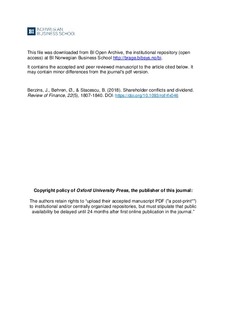Shareholder conflicts and dividends
| dc.contributor.author | Berzins, Janis | |
| dc.contributor.author | Bøhren, Øyvind | |
| dc.contributor.author | Stacescu, Bogdan | |
| dc.date.accessioned | 2018-09-13T09:00:04Z | |
| dc.date.available | 2018-09-13T09:00:04Z | |
| dc.date.created | 2018-01-02T08:03:53Z | |
| dc.date.issued | 2018 | |
| dc.identifier.citation | Review of Finance. 2018, 22 (5), 1807-1840. | nb_NO |
| dc.identifier.issn | 1572-3097 | |
| dc.identifier.issn | 1875-824x | |
| dc.identifier.uri | http://hdl.handle.net/11250/2562427 | |
| dc.description.abstract | We examine how dividend policy is used to mitigate potential conflicts of interest between majority and minority shareholders in private Norwegian firms. The average payout is 50% higher if the majority shareholder’s equity stake is 55% (high conflict potential) rather than 95% (low conflict potential). Such minority-friendly payout is also associated with higher subsequent minority shareholder investment. These results suggest that controlling shareholders voluntarily use dividends to reduce agency conflicts and build trust, rather than opportunistically preferring private benefits to dividends. We show that our results are unlikely to arise from liquidity or signaling motives. | nb_NO |
| dc.language.iso | eng | nb_NO |
| dc.publisher | Oxford University Press | nb_NO |
| dc.title | Shareholder conflicts and dividends | nb_NO |
| dc.type | Journal article | nb_NO |
| dc.type | Peer reviewed | nb_NO |
| dc.description.version | acceptedVersion | nb_NO |
| dc.source.pagenumber | 1807-1840 | nb_NO |
| dc.source.volume | 22 | nb_NO |
| dc.source.journal | Review of Finance | nb_NO |
| dc.source.issue | 5 | nb_NO |
| dc.identifier.doi | 10.1093/rof/rfx046 | |
| dc.identifier.cristin | 1533378 | |
| dc.description.localcode | 2, Forfatterversjon | nb_NO |
| cristin.unitcode | 158,1,0,0 | |
| cristin.unitname | Institutt for finans | |
| cristin.ispublished | true | |
| cristin.fulltext | postprint | |
| cristin.qualitycode | 2 |
Files in this item
This item appears in the following Collection(s)
-
Publikasjoner fra CRIStin - BI [978]
-
Scientific articles [2147]
